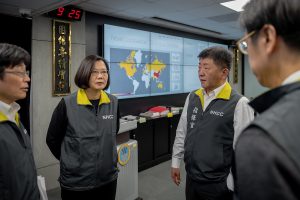A U.S. representative to the United Nations called on the World Health Organization (WHO) to directly engage with Taiwan, while Vice President-elect William Lai attended the Trump-hosted National Prayer Breakfast in Washington, as the world battles the outbreak of the Wuhan coronavirus.
Taiwan also faced difficulties in repatriating its citizens from Wuhan. Beijing initially told Taipei it could not send charter planes to evacuate Taiwanese nationals, which several other countries have done, before allowing one flight into Wuhan earlier this week.
As of Thursday, Taiwan had confirmed 16 cases of the coronavirus. But its exclusion from international organizations, including the WHO and the International Civil Aviation Organization (ICAO), has hindered its efforts to receive speedy and accurate information as it responds to the outbreak.
On Thursday, Foreign Minister Joseph Wu lashed out at the WHO on Twitter over its changing designations for the country, which it considers a part of China. “What’s wrong with you?” he wrote. “First you called us ‘Taiwan, China,’ then you changed to ‘Taipei.’ You misreported the confirmed cases, & now you call us ‘Taipei & Environs.’ Look! Taiwan is #Taiwan & not any part of the #PRC.”
Wu has blamed the WHO for inaccurately reporting data on the coronavirus in Taiwan due to its changing classifications for the country. On Sunday, Wu said the WHO’s “inaccurate information” was responsible for decisions by Italy and Vietnam to ban flights to and from Taiwan. (Vietnam reversed its decision later that day.)
Despite mounting international criticism, the WHO continues to exclude Taiwan and bar it from its annual World Health Assembly at the urging of Beijing.
On Thursday, Andrew Bremberg, the U.S. permanent representative to the Office of the United Nations, said the coronavirus makes it “a technical imperative that [the] WHO present visible public health data on Taiwan as an infected area and engage directly with Taiwan public health authorities on actions.”
Bremberg made his comments at a WHO executive board meeting in Geneva, a venue from which Taiwanese representatives are shut out.
Representatives from six of Taiwan’s 15 diplomatic allies joined in the growing calls for Taiwan’s inclusion in the WHO.
Hua Chunying, spokeswoman for China’s foreign ministry, responded to the Italian flight ban on Monday by offering “strong support” if Taiwanese “encounter difficulties overseas,” but said Taiwan could only take part in the WHO under a “one China” principle, according to Reuters. A WHO spokesman also told Reuters Taiwan experts had been included in coronavirus consultations, although Taiwanese officials say they must wait for information on the virus to show up on WHO websites.
Lai, prior to his trip to Washington, had indicated he would raise the issue of Taiwan’s exclusion from the WHO during meetings with U.S. policymakers.
During his U.S. trip – the highest-profile U.S. visit by a Taiwanese political figure since the United States severed ties with Taiwan in 1979, although he said he was attending in a private capacity – Lai met with House Speaker Nancy Pelosi and senators Marco Rubio, Bob Menendez, Cory Gardner, and Jim Risch. He also visited the U.S. National Security Council.
Lai sat at a table with Senator Lindsey Graham during Thursday morning’s prayer breakfast, hosted by Trump and attended by dozens of high-profile U.S. and international political figures.
Lai’s visit was not met with opposition by any U.S. figures and was seen in Taiwan as a sign of close ties between Taiwan and the United States.
Meanwhile, Taiwan’s efforts to repatriate its citizens from Wuhan have led to a spat with Beijing after the first flight from Wuhan to Taiwan, on Monday, carried a passenger infected with the coronavirus. Three others on the flight had fevers, and all 247 passengers abroad are now in quarantine.
Taiwan has accused China of not allowing more evacuation flights, while China has said Taipei blocked the flights. Local media reported that Chinese officials collaborated with members of Taiwan’s opposition Kuomintang (KMT) when drafting flight manifests rather than allowing Taiwan’s government to directly handle the evacuation.
Taiwan President Tsai Ing-wen accused China of not prioritizing the elderly, children, and other vulnerable groups on Monday’s flight back to Taiwan despite having agreed to prioritize those most at risk of becoming infected.
Taiwan has temporarily banned the entry of Chinese and foreign nationals who have been in China, Hong Kong, or Macau over the past 14 days.

































